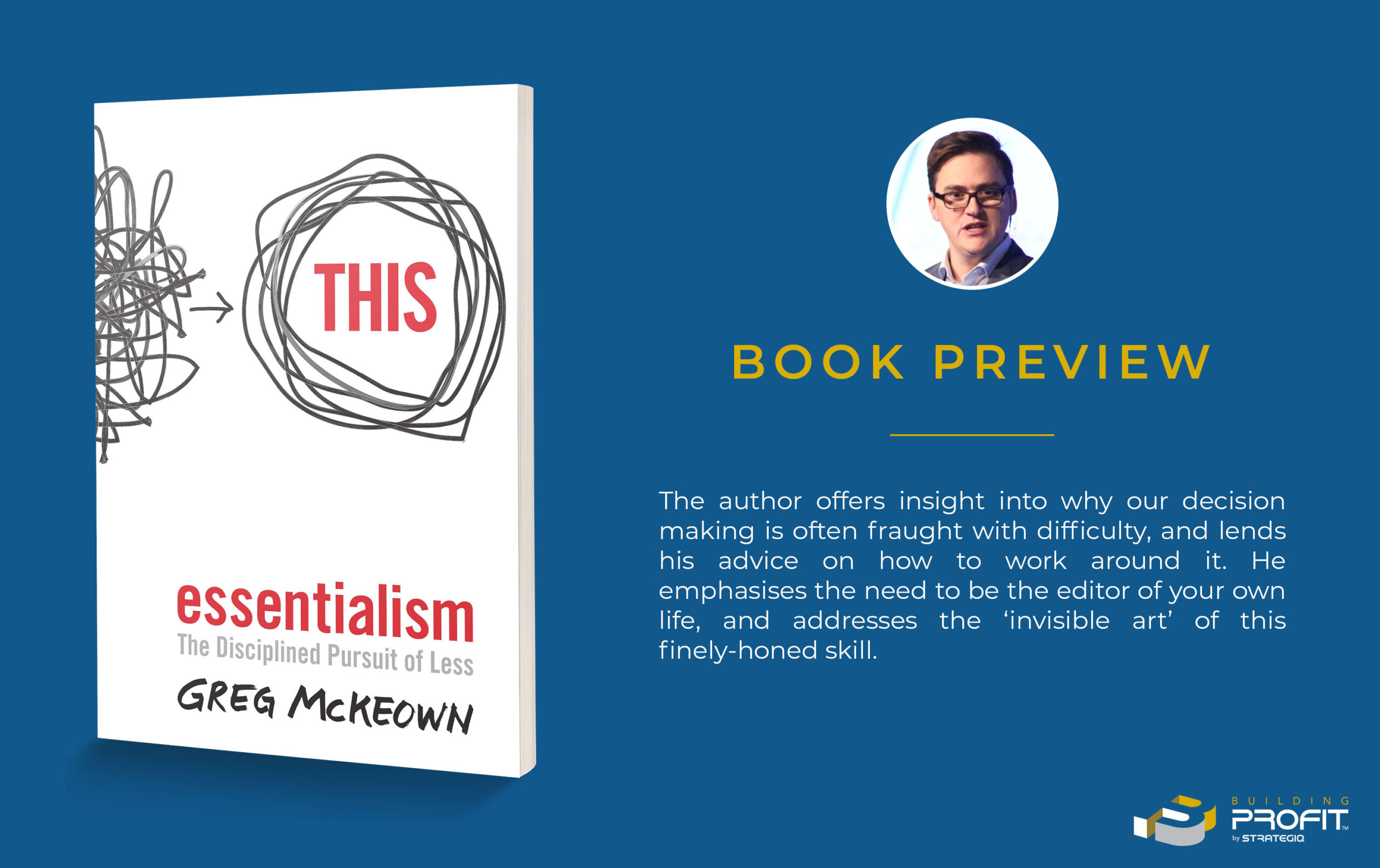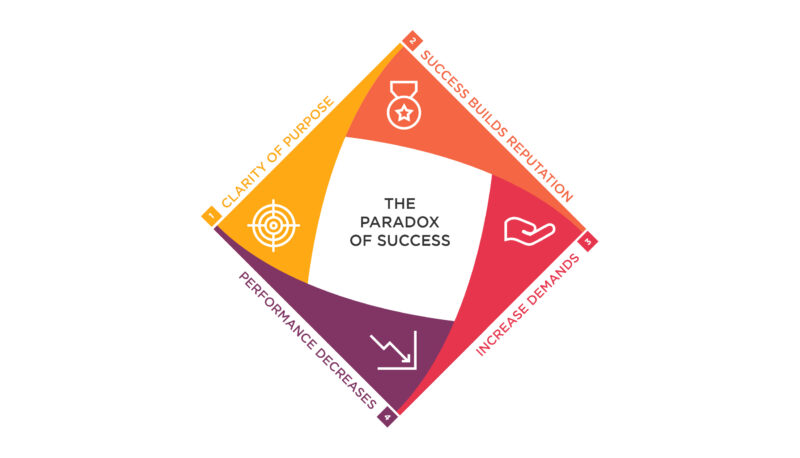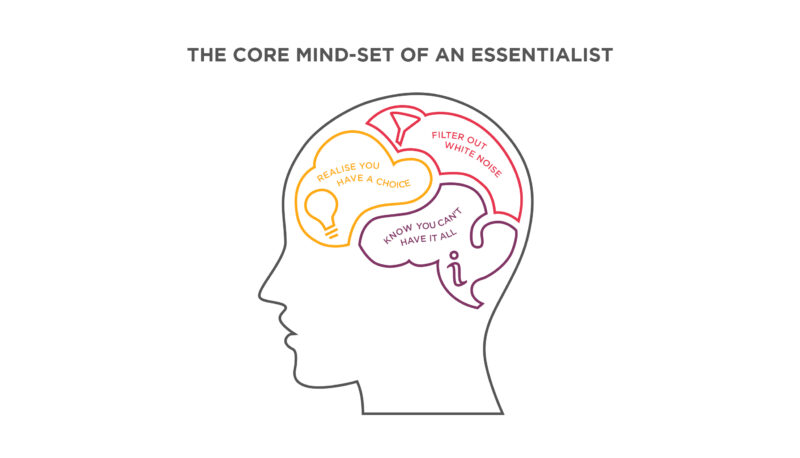The disciplined pursuit of less.

As the title suggests, to become an Essentialist – is to become thoroughly disciplined in your way of thinking, and to make choices that create space solely for the things that truly matter.
In this book, the author helps you find the real meaning in your life by stripping it back to basics. He recommends keeping only the essentials, and discarding the rest.
In today’s society, there is an incessant need to keep up with the Joneses – a relentless pressure to have it all, and a constant fear of missing out.
McKeown aims to lighten the load – proposing that the key is in saying ‘yes’ to the right things, and being ok to say ‘no’ to everything else. He can’t tell you exactly what is right for you – but he can show you how to get there.
By using the methods cited in this book, you are offered the chance to swap the festering scourge of burnout and stress for total control of your well-being and happiness.
In his opening chapter, McKeown raises the red flag:
If you don’t prioritise your life, someone else will
If you let other people take control and make all the decisions for you, you’ll sink deeper into a life plagued by regrets and what ifs. You’ll become ensnared by the death grip of overwhelm and dispassion. And it will become harder to distinguish between what is important and what lacks significance.
People unwittingly get caught up in what is referred to as:
The Paradox of Success

In a muddled-up world where certain behaviours are rewarded and others frowned upon, McKeown has discovered this predictable four-pronged outcome:
1. There is clarity of purpose, which leads to your success.
2. Success leads to a reputation for being the ‘go to’ person.
3. This leads to more demands upon your time and energy, and your resources being spread too thin.
4. The effect of your success has been undermined and you no longer perform as well.
In other words, the pursuit of success can be a catalyst for failure.
When applied to the world at large, the crux of it is – we have too many choices. It is difficult to be discerning. Psychologists refer to this as “decision fatigue”. And it’s not helped by the ever-increasing expectations placed upon us by others, or the belief that we have to be all things to all people.
Pave the way for Essentialism …
The ‘wardrobe’ of our lives
McKeown likens his strategies for making better life choices to how a professional organiser might sort through your wardrobe.
The process is the same:
1. Explore and Evaluate: astute analysis of whether it can be eliminated
2. Eliminate: brutal honesty about what stays and what goes
3. Execute: a plan that makes elimination as effortless as possible
Once this process has been accomplished, you then need to avoid the temptation of accumulating new non-essentials in your ‘wardrobe’ – i.e. the disciplined pursuit of less.

1. Realising you have a choice
2. Filtering out the white noise
3. Knowing you can’t have it all
One of the prime differences between Essentialists and non-Essentialists is that, paradoxically – Essentialists explore more options before committing to any, whereas their non-Essentialist counterparts simply commit to everything. The latter don’t seem to realise they even have a choice – they think almost everything is essential.
McKeown reiterates that – we live in a world where almost everything is worthless and very few things are exceptionally valuable.
You have to examine all things on the table and make the best decision. Indeed, it was Socrates who said, “An unexamined life is not worth living”.
Less but better
Quality over quantity – a phrase that exudes great power.
Whether in schools, businesses, society, or on an individual level – the courage to create meaning and to be true to oneself or community is where the magic happens. You’re here for a good time, not a long time – so you’d want to choose wisely. Be present and focus only on what matters. Make it count.
Remember, the important things are not necessarily the big things.
Carpe diem.
The invincible power of choice
By sacrificing your power to choose, you do make a choice – a bad one.
A choice is not just something you have, it’s something you do. You have to take action. You may not always have complete control over your options, but you still get to call the shots on which of those options you run with.
You have to choose to choose. When you forget your ability to do so, you become helpless and vulnerable.
The trade-off
This approach to success is about making informed, calculated and deliberate choices by design, not default. You decide what you’re prepared to forego in order to get what you really want. You need to act intentionally, and not have sacrifices forced upon you. Many try to avoid the trade-off, but it ends up catching up with them. In the end, you can’t escape it.
The five elements of exploring what is essential
1. Space to think
2. Time to look and listen
3. Permission to play
4. Wisdom to sleep
5. Discipline to apply highly selective criteria
Interestingly, to the non-Essentialist, these things are seen as trivial distractions.
But the purpose of these practices is to discern the vital few from the trivial many. Without them, you will not be able to stop and smell the roses and determine what really matters to you. Instead, you will continue to be blindsided by a world of “productivity”.
The devil is in the detail.
How can we cut out the trivial many?
If it’s not a resounding ‘yes’ – then it’s a ‘no’. Likewise, if you fail to say ‘no’ to something trivial, it becomes ‘yes’ by default. ‘No’ is a complete sentence. It requires no apologies or explanation. You have to know your boundaries.
In addition:
The author offers further insight into why our decision making is often fraught with difficulty, and lends his advice on how to work around it. He emphasises the need to be the editor of your own life, and addresses the ‘invisible art’ of this finely-honed skill.
McKeown then elaborates on how to create efficient systems in order to prevent more non-essentials from creeping into your world. Once this process is mastered, the rest becomes a breeze. Preparation is key.
To become an Essentialist, is to incorporate a disciplined mindset at every turn. It has to feel effortless, and it has to become routine – just like brushing your teeth.
It is not something you do, it’s something you are.

Leave A Comment